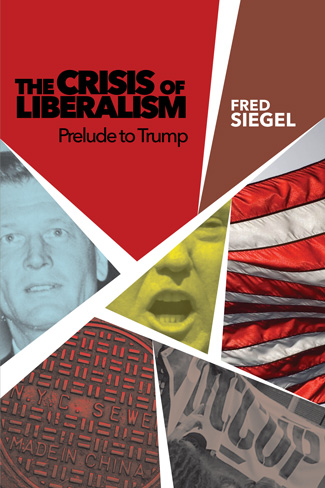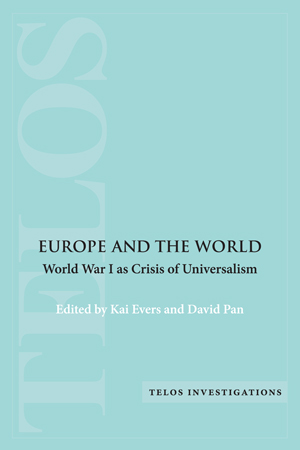In today’s episode of the Telos Press Podcast, Camelia Raghinaru talks with Annabel Herzog about her article “When Arendt Said ‘We’: Jewish Identity in Hannah Arendt’s Thought,” from Telos 192 (Fall 2020). An excerpt of the article appears here. If your university has an online subscription to Telos, you can read the full article at the Telos Online website. For non-subscribers, learn how your university can begin a subscription to Telos at our library recommendation page. Purchase a print copy of Telos 192 in our online store.
|
From the beginning of Donald Trump’s campaign for the presidency and throughout his administration, the most consistent point of orientation in his politics has been the priority of the nation. It informed the slogan “Make America Great Again,” which initially shocked political sensibilities, since it implied the accusation that previous bipartisan political leadership had stood by during a decline or even facilitated a loss of greatness. The priority of the nation similarly underpinned the formula of “America First,” as the designation of a foreign policy that would give greater attention to national interest and therefore break with established patterns of multilateralism. Trump himself has embraced the term “nationalist,” and this marks his difference from both the free trade internationalism that used to define the neoliberal Republicans as well as from the multiculturalism that dominates the identity-political Democrats. Between those two alternatives, globalism and fragmentation, Trump has opted for the nation. With that choice, he put his finger on the forgotten category—class—in an era of growing inequality. “Nation” serves as the organizing principle for programs purporting to achieve vertical integration, the “whole nation,” i.e., a promise—whether fulfilled or not—of an inclusive nationalism. Trump’s nationalism therefore is better described as a national populism. This aspiration for inclusion outweighs a simultaneous function of exclusionary nationalism, the differentiation from other nations, although that aspect clearly plays a role as well, especially in immigration policies. Now available for pre-order from Telos Press Publishing: The Crisis of Liberalism: Prelude to Trump, by Fred Siegel. Pre-order the paperback edition today in our online store and save 30% off the list price. Offer expires 9/30/20. Also available now in Kindle ebook format. Release dates: October 1, 2020 (paperback), September 15, 2020 (ebook).
by Fred Siegel In The Crisis of Liberalism: Prelude to Trump, Fred Siegel leverages New York City to uncover the key political conflicts and social contradictions in American liberalism over the last century. This wide-ranging collection of essays critically recounts how passionate intellectual debates over how to realize “the good life” in the modern city emerged from the writings of early progressive “thought leaders,” who envisioned a new educated elite capable of enlightened democratic governance. The flaws in this approach, as Siegel shows, expressed themselves most floridly in John Lindsay’s New York, whose flashy limousine liberals were a preview of today’s politically correct gentry liberalism. Its cultural programs over the past half-century repeatedly failed the downtrodden underclass and alienated middle-class New Yorkers trapped in economic stagnation. By neglecting voters’ real concerns over illegal immigration and China’s emerging threats, globalist technocratic liberals ultimately set the stage for Donald Trump’s angry nationalist demand to put “America First.” The ongoing Sudanese revolution has emerged at a time when most of us had already given up any realistic hope for what has become known as the Arab Spring. Yet, if anything, the revolutionaries in Sudan have the best chance yet of simultaneously defeating both nationalist dictatorship and religious fundamentalism. This would be no small feat; it would arguably mark the most significant historical turning point in the struggle for democracy in the Middle East and North Africa (MENA) since World War II. Since the protests began in Tunisia in late 2010, the Arab Spring has repeatedly failed to deliver on its promise of democratic governance. I argue that this is primarily because the protest movements have simply not been revolutionary enough to break free from the dominating orbit of the retroactive forces of nationalist dictatorships and religious fundamentalism. Under these circumstances, the non-violent, mostly liberal movements were quickly neutralized, demonstrating the degree to which the death of the Left has left contemporary societies at the mercy of fascist forces. New from Telos Press: Europe and the World: World War I as Crisis of Universalism, edited by Kai Evers and David Pan. Order your copy in our online store, and save 20% on the list price by using the coupon code BOOKS20 during the checkout process.
|
||||
|
Telos Press Publishing · PO Box 811 · Candor, NY 13743 · Phone: 212-228-6479 Privacy Policy · Data Protection Copyright © 2025 Telos Press Publishing · All Rights Reserved |
||||




